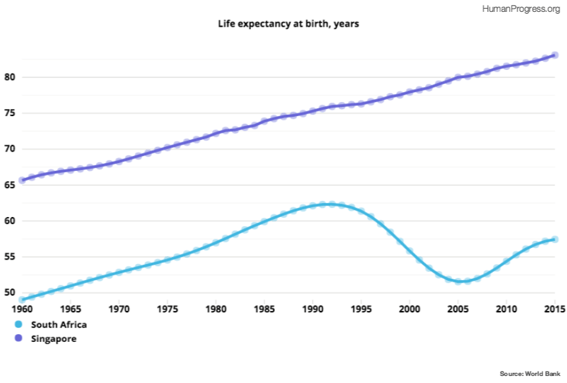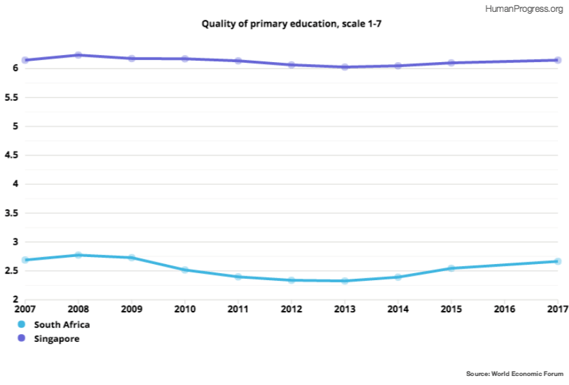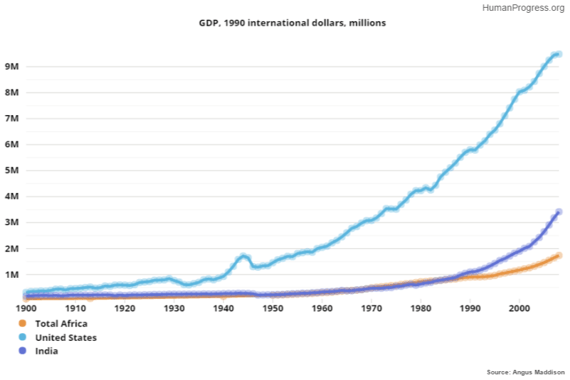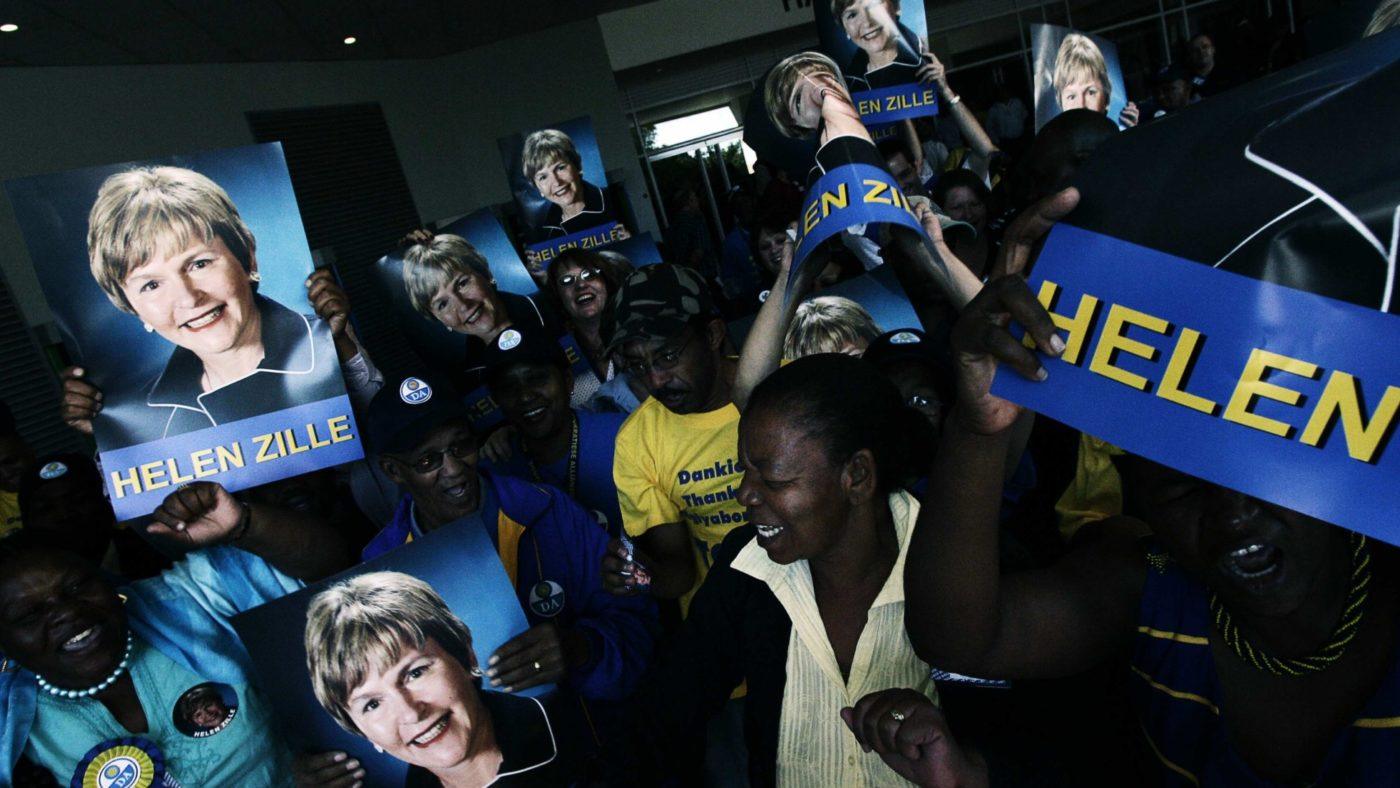Two weeks ago, I wrote about disturbing developments in South Africa, where the government is contemplating land expropriation without compensation, and I warned of terrible economic consequences that would follow such a policy.
Of course, the formulation and evaluation of policies, such as land expropriation, presume the existence of free speech, and the ability of supporters and opponents to have their arguments heard. But the political firestorm that has engulfed the Premier of Western Cape, Helen Zille, following her tweets in praise of some aspects of the British colonial legacy in Singapore, raise serious questions about the very possibility of reasoned debate in South Africa. It does not augur well for the future of the country.
So, let us start with Zille’s supposed offence. Having spent a week on a business trip to Singapore and waiting to board a plane to Cape Town, Zille published a series of tweets:
For those claiming legacy of colonialism was ONLY negative, think of our independent judiciary, transport infrastructure, piped water etc.
— Helen Zille (@helenzille) March 16, 2017
Would we have had a transition into specialised health care and medication without colonial influence? Just be honest, please.
— Helen Zille (@helenzille) March 16, 2017
Getting onto an aeroplane now and won't get onto the wi-fi so that I can cut off those who think EVERY aspect of colonial legacy was bad.
— Helen Zille (@helenzille) March 16, 2017
What might have prompted such thoughts in the mind of a former anti-apartheid activist – a fearless journalist who exposed the extra-judicial killing of the Black Consciousness leader, Steve Biko, as well as a politician who has so successfully navigated the treacherous waters of South African politics for the last two decades?

Well, esteemed reader, cast your eyes upon the chart above. Crazy though it may sound today, the average South African was 17 per cent richer than the average citizen of Singapore in 1950. In fact, South African incomes kept pace with those in Singapore all the way to 1969.
Today, the average income in South Africa is 16 per cent of that in Singapore. Between 1950 and 2016, incomes in South Africa rose by 101 per cent. In Singapore they rose 1,344 per cent. The gap in terms of life expectancy has also grown wider between the two.

And the quality of schooling is, so to speak, worlds apart.

The tenets of political correctness, unfortunately, dictate that Zille’s comments could not possibly come out of justified despair for the socio-economic performance of South Africa in recent decades. Predictably, the erstwhile opponent of white rule now stands accused of racism.
That the neutered and cowardly South African intelligentsia should reach for such a lazy and dishonest explanation of Zille’s tweets is unsurprising. What is surprising is the speed with which Zille was abandoned by her own party. The leader of the Democratic Alliance, Mmusi Maimane, has even referred her to the party’s Legal Commission for punishment.
Under pressure, Zille caved in:
I apologise unreservedly for a tweet that may have come across as a defence of colonialism. It was not.
— Helen Zille (@helenzille) March 16, 2017
Pity, because colonialism did leave behind, in addition to a lot of bad, a lot of good. But, don’t take my word for it. Here is what the former Indian Prime Minister Manmohan Singh said at Oxford University in 2005:
“Today, with the balance and perspective offered by the passage of time and the benefit of hindsight, it is possible for an Indian Prime Minister to assert that India’s experience with Britain had its beneficial consequences too. Our notions of the rule of law, of a Constitutional government, of a free press, of a professional civil service, of modern universities and research laboratories have all been fashioned in the crucible where an age-old civilization met the dominant Empire of the day.
“These are all elements which we still value and cherish. Our judiciary, our legal system, our bureaucracy and our police are all great institutions, derived from British-Indian administration and they have served the country well.
“The idea of India as enshrined in our Constitution, with its emphasis on the principles of secularism, democracy, the rule of law and, above all, the equality of all human beings irrespective of caste, community, language or ethnicity, has deep roots in India’s ancient civilization. However, it is undeniable that the founding fathers of our republic were also greatly influenced by the ideas associated with the age of enlightenment in Europe.
“It used to be said that the sun never sets on the British Empire. I am afraid we were partly responsible for sending that adage out of fashion! But, if there is one phenomenon on which the sun cannot set, it is the world of the English-speaking people, in which the people of Indian origin are the single largest component. Of all the legacies of the Raj, none is more important than the English language and the modern school system. That is, if you leave out cricket!
No nation has a right to colonise another. Unfortunately, that is not how human history unfolded – before modern sensitivities put an end to imperialism.

That said, some countries have built upon their colonial legacies, and achieved a great degree of abundance and tranquility. Australia, Canada, Hong King, New Zealand, Singapore and, lest we forget, the United States, come to mind.
Others, most of Africa included, have repudiated the colonial legacy altogether. What a pity.
It is, probably, too late to save the career of this remarkably intelligent, successful and courageous woman, Helen Zille. It is not too late, however, to urge all intellectually honest and well-meaning South Africans to recognise that defence of colonialism and evaluation of colonial legacy are two very different things.


